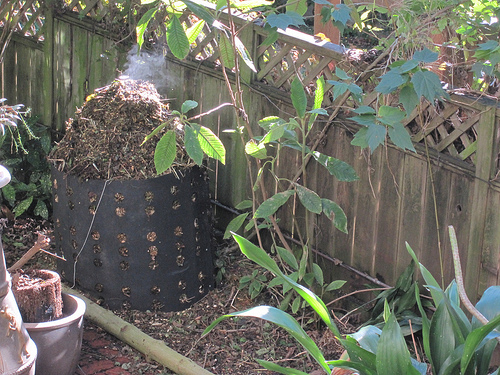If you’d like your garden to be just a bit “greener” than it normally is, why not try making your own organic compost? Composting is a great way to deal with yard waste, allowing you to put it to good use instead of paying to have it sent to the landfill. As a result, your garden will be healthier and greener, and the environment will be “greener”, too. Plus you’ll have more “green” left in your wallet. If you’ve never tried making compost before, here are some tips to help you get started.
Choosing a Composting Method
There are plenty of ways to make compost, ranging from a simple heap or pile in your backyard to a specially designed composting bin. If you don’t mind waiting between six months and two years to use your compost, you could use a basic enclosed bin. However, composting units designed to allow you to mix and tumble the compost can really reduce composting time. You could also simply create a pile of material in a corner of your yard. If you choose this method, you’ll have to turn the compost occasionally, using a pitch fork, to provide it with proper aeration.
Beginning the Composting Process
Once you’ve selected your preferred method of composting, you’ll want to choose a location for your compost bin or pile. In most cases, a corner area of the yard that is in close proximity to the garden is the best choice. A location that gets some sun will help heat the compost, allowing it to decompose more quickly. If you live in an area that gets a lot of rain, you might want to build a small shelter over your compost pile to keep it from getting overly wet.
You can improve the quality of your compost as well as reduce the processing time by adding your yard waste materials carefully. Grass clippings can add nitrogen, but you should mix them in with “brown” materials such as dried leaves, straw or small branch clippings to add the necessary carbon. By doing so, your compost will decompose faster with less odor. You can also add shredded newspaper to your compost pile, as well as coffee grounds and kitchen vegetable scraps.
However, you should never add fatty materials such as animal products to your compost bin. Likewise, you should never add pet waste, to avoid unpleasant odors and the possible spread of diseases. If you are starting a new compost pile, you can get the process started right by incorporating some aged manure, blood meal, alfalfa meal, cotton seed meal or compost starter into the mix.
Maintaining and Using Your Compost
As your compost ages, be sure to turn it every couple of weeks in order to keep it well aerated. Don’t pack the composting materials down too tightly, as this will keep it from decomposing properly. When your compost has fully decomposed, you should be left with a dark material that looks and feels a lot like fertile soil.
To use your compost, simply spread it onto the soil and work it in, ideally a couple of weeks before planting. You can also soak finished compost in a bucket of water, creating a nutrient-rich “tea” that you can use to water your garden or household plants.
(Article Source: BuildDirect Blog – Read original article here)

